[T]he federal government brought in less revenue in 2004 than in 2000, in part as a result of tax cuts and a sluggish economy. Federal spending increased 28 percent between those years.
Source: "After Bleak Period, States' Revenues Rise, Governors Report" By ROBERT PEAR - NY Times - July 8, 2005
One year ago [2004], when [Bush] first pledged to cut the deficit in half by the 2009 fiscal year, the White House predicted that the budget deficit would decline to $364 billion in 2005 and $68 billion in 2006.
Now, the White House is predicting that the budget deficit will rise to $427 billion in 2005, the current fiscal year, and decline to only $390 billion in 2006.
Many of the savings that Mr. Bush is proposing are recycled ideas included in budgets year after year to show a lower projected deficit, even though their enactment is doubtful.
Budget analysts noted on Monday [2/7/05] that Mr. Bush's plan also assumed a sharp slowdown in the growth of military spending, which has soared 35 percent in the past four years.
Administration officials acknowledged that their [Social Security privatization] plan would force the government to borrow $774 billion [over] the next decade, and several trillion more in the decades that follow… All this borrowing will show up in annual budget deficits.
Source: "Big Picture May Seem Rosy, but Deficit's in the Details" by Edmond L. Andrews and David E. Rosenbaum - New York Times - 2/8/05
Spending for domestic programs, aside from security and entitlements like Medicare and Social Security, would decline slightly in 2006, to $389 billion, and would remain flat for the next four years -- a freeze with no obvious precedent on the last two decades.
On indication of new priorities is Mr. Bush's proposal to end the Community Services Block Grant, a $637 million program that helps pay for community action agencies begun more than 35 years ago as part of the fight against poverty.
The agencies provide housing, nutrition, education and employment services to low-income people.
The Low-Income Home Energy Assistance Program, which helps people pay their heating bills, would be cut 8.4 percent, to $2 billion.
[T]he Association of State and Territorial Health Officials, representing health officers of the 50 states, said the cuts [to the budget of the Centers for Disease Control and Prevention] would "leave the nation vulnerable to public health emergencies," including bioterrorist attacks and infectious disease.
Lawrence A. McAndrews, president of the National Association of Children's Hospitals, said [Medicaid] cuts would force many hospitals to reduce or eliminate services. Medicaid accounts for more than 40 percent of the revenue at such hospitals, he said, and "the care of all children, not just those on Medicaid, would be affected by the reduction of services."
The president would also cut $100 million from a $301 million program that trains doctors at children's hospitals. He would cut the budget for training other health professionals by 64 percent, to $160.5 million.
Source: "Subject to Bush's Knife: Aid for Food and Heating" by Robert Pear - New York Times - 2/8/05
[I]n 1996, a Democratic president, Bill Clinton, declared, "The era of big government is over."
Yet government has only grown. The Cato Institute, a libertarian research institution, says overall federal spending has increased twice as fast under Mr. Bush as under Mr. Clinton. At the same time, the federal deficit is projected to hit a record high of $427 billion this year [2005].
These trends seem likely to continue. The White House estimated last week that the cost of prescription drugs for Medicare beneficiaries, originally projected at $400 billion from 2004 to 2013, would, in fact, be $724 billion from 2006 to 2015. Republicans called for scaling back the benefit, but on Friday [2/11/05], Mr. Bush said no and vowed to veto any changes to the Medicare bill.
For most Americans, the federal budget, more than 2,000 pages of fine print, is hard to grasp; it isn't easy to summon a mental image of $2.57 trillion. One way to look at it is to consider how much the government spends per household. In the 1990's the figure held steady at about $18,000, according to Brian M. Riedl, a budget analyst for the Heritage Foundation. But last year, it exceeded $20,000, adjusted for inflation, the highest amount since World War II. But the government only takes in $17,000 for each household. "So right there," Mr. Reidl said, "we're borrowing $3,000 per household."
Source: "The Republican Revolution That Wasn't" by Sheryl Gay Stolberg - New York Times - 2/13/05
Tax revenues are approximately 16.5 percent of gross domestic product, the lowest level since 1960, and spending is roughly 20 percent. [A]ny entitlement reforms like to be proposed would have little immediate effect.
But as Business Week, not an advocate of activist government, said in a recent editorial, "the deficit morass is due as much to a revenue shortfall as to excessive spending." (The 2001 and 2003 tax cuts, for example, are estimated to have a 75-year cost of $11 trillion, almost three times the entire Social Security deficit.)
For example, if the tax cuts for those earning above $200,000 were repealed and the inheritance taxes as reformed were continued rather than eliminated, the 10-year projected deficit would be reduced by roughly $1.1 trillion, or almost 25 percent, and the 75- year fiscal reduction would be roughly $3.9 trillion, or approximately equal to the Social Security shortfall. This course of action would be similar to the income tax increases that were combined with spending cuts in the 1993 deficit reduction program, which some predicted would lead to recession but which, instead, was followed by the longest economic expansion in our nation's history.
Source: "Attention: Deficit Disorder" by Robert Rubin (Treasury Secretary 1995-1999) - New York Times - 5/13/05
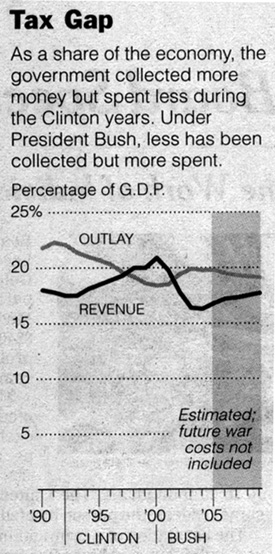
Source: Congressional Budget Office via New York Times - 2/8/05
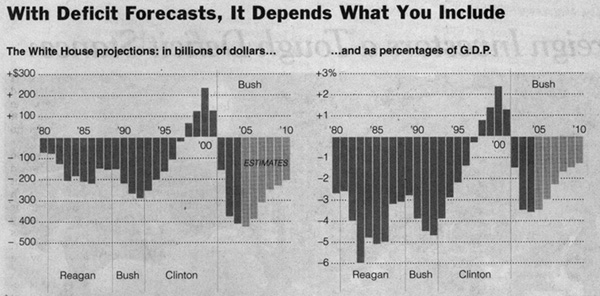
Source: Office of Management and Budget via New York Times - 2/8/05
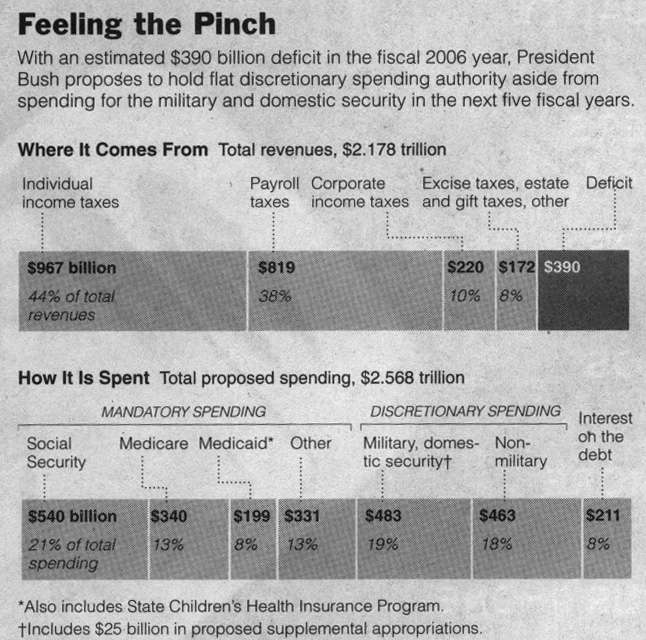
Source: Office of Management and Budget via New York Times - 2/8/05
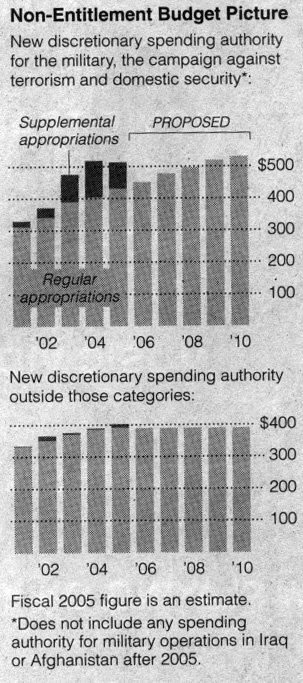
Source: Office of Management and Budget via New York Times - 2/8/05
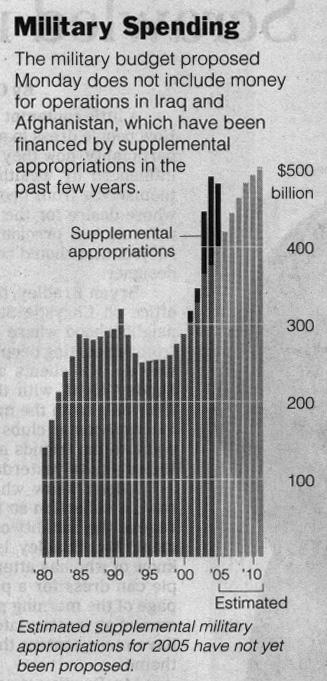
Source: Office of Management and Budget;Department of Defense via New York Times - 2/8/05